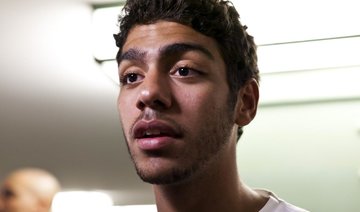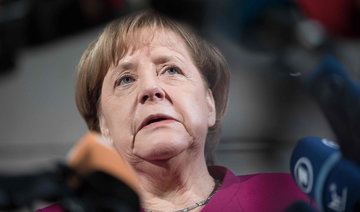BERLIN: Germany signalled Monday it was open to amending a controversial law combatting online hate speech as the justice minister fell victim to the rules he himself championed.
The move came after Twitter deleted a post by Heiko Maas dating back to 2010 before he was appointed justice minister, in which he called a fellow politician “an idiot.”
The post was deleted after Twitter received several complaints, fueling a simmering row over the new regulation which critics say stifle freedom of speech.
Government spokesman Steffen Seibert said an evaluation would be carried out within six months to examine how well the new law was working.
“It’s best to conduct the evaluation with an open mind, and then we’ll see what experience can be drawn from it, what impact and then all that would be weighed up,” he told reporters.
Germany adopted the law, one of the toughest in the world, after a surge in racist and incendiary speech online, particularly after the arrival of more than one million asylum-seekers since 2015.
The legislation, which came into force on Jan. 1, requires social media giants to remove hate speech and other illegal content, or risk fines of up to €50 million ($57 million).
Companies such as Twitter and Facebook have 24 hours to remove posts that openly violate German law after they are flagged by users.
But critics said the law pushes social media companies into taking a pro-active stance in deleting potentially offensive posts, effectively handing them the power of censorship.
Parties including the AfD, the pro-business FDP, far-left Linke as well as Chancellor Angela Merkel’s Bavarian allies CSU are lining up to demand it be scrapped or amended.
The row returned to haunt the justice minister over the weekend when he found his tweet about Thilo Sarrazin, a politician who wrote a controversial book on Muslim immigrants, had been deleted.
Speaking to Bild on Monday, Maas said he “did not receive any information from Twitter about why the tweet was deleted,” admitting there are “things that I would no longer tweet today.”
Barely a week after coming into force, the new law has sparked intense debate as it snared high-profile individuals.
Far-right MP Beatrix von Storch became the first prominent politician to fall foul of the new rules with posts deleted from both Twitter and Facebook.
Von Storch, deputy leader of the anti-immigration AfD party’s parliamentary group, had criticized Cologne police for sending a New Year’s greeting in Arabic on Twitter.
“What the hell is going on with this country? Why is an official police site ... tweeting in Arabic?” she wrote. “Did you mean to placate the barbaric, Muslim, gang-raping hordes of men?”
Her colleague Jens Maier is facing a criminal complaint over a tweet that called Boris Becker’s son a “half-negro.”
The AfD capitalized on discontent against a mass influx of asylum seekers to Germany since 2015 to make the strongest showing for a far-right party in a national election in the post-war era.
Berlin to evaluate online hate law amid Arabic police greeting Twitter storm
Berlin to evaluate online hate law amid Arabic police greeting Twitter storm
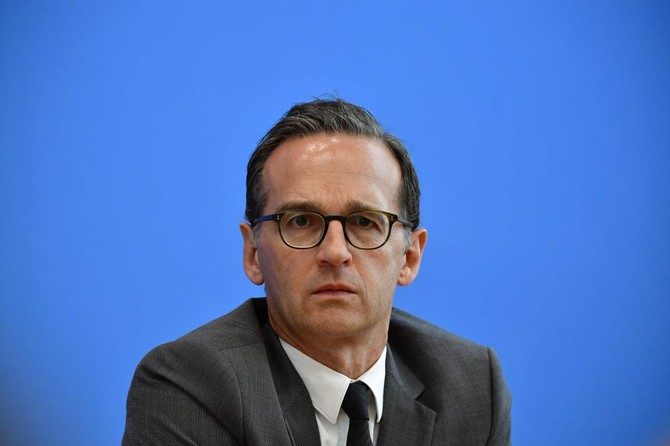
TikTok CEO to fight US ban law
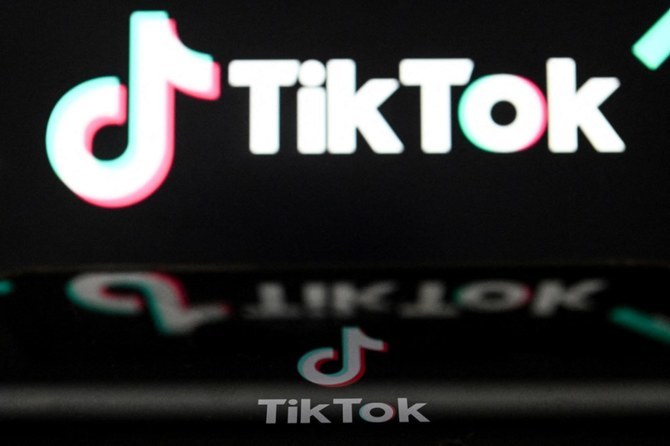
WASHINGTON: TikTok’s chief executive said on Wednesday that the company expects to win a legal challenge to block legislation signed into law by US President Joe Biden that he said would ban the popular short video app used by 170 million Americans.
“Rest assured — we aren’t going anywhere,” CEO Shou Zi Chew said in a video posted moments after Biden signed the bill that gives China-based ByteDance 270 days to divest TikTok’s US assets or face a ban. “The facts and the Constitution are on our side and we expect to prevail again.”
Biden’s signing sets a Jan. 19 deadline for a sale — one day before his term is set to expire — but he could extend the deadline by three months if he determines ByteDance is making progress. Biden is seeking a second term against former President Donald Trump.
In 2020, Trump was blocked by the courts in his bid to ban TikTok and Chinese-owned WeChat, a unit of Tencent, in the United States.
Chew added: “Make no mistake — this is a ban on TikTok.” He emphasized that TikTok would continue to operate as the company challenges the restrictions.
Driven by widespread worries among US lawmakers that China could access Americans’ data or surveil them with the app, the bill was overwhelmingly passed late on Tuesday by the US Senate. The US House of Representatives approved it on Saturday.
The four-year battle over TikTok is a significant front in a war over the internet and technology between Washington and Beijing. Last week, Apple said China had ordered it to remove Meta Platforms’ WhatsApp and Threads from its App Store in China over Chinese national security concerns.
TikTok is set to challenge the bill on First Amendment grounds and TikTok users are also expected to again take legal action. A US judge in Montana in November blocked a state ban on TikTok, citing free-speech grounds.
The American Civil Liberties Union said banning or requiring divestiture of TikTok would “set an alarming global precedent for excessive government control over social media platforms.”
However, the new legislation is likely to give the Biden administration a stronger legal footing to ban TikTok if ByteDance fails to divest the app, experts say.
If ByteDance failed to divest TikTok, app stores operated by Apple, Alphabet’s Google and others could not legally offer TikTok or provide web hosting services to ByteDance-controlled applications or TikTok’s website.
The bill would also give the White House new tools to ban or force the sale of other foreign-owned apps it deems to be security threats.
Democratic Senator Ron Wyden said he was concerned the bill “provides broad authority that could be abused by a future administration to violate Americans’ First Amendment rights.”
Republican presidential candidate Donald Trump said on Monday that President Joe Biden was “pushing” for a ban on TikTok and would be the one responsible if a ban were imposed, urging voters to take notice.
Biden’s re-election campaign plans to continue using TikTok, a campaign official said on Wednesday. Trump’s campaign has not joined TikTok.
Biden signed legislation in late 2022 that barred US government employees from using TikTok on government phones.
Advertising network MCN launches influencer practice in Mideast

DUBAI: Regional advertising group Middle East Communications Network has launched a dedicated influencer practice in the Middle East, North Africa and Turkiye to help clients across the group’s agencies, including FP7McCann, MullenLowe, UM, and Weber Shandwick.
Rami Gholmieh has been appointed to lead the practice as the regional director of influencer marketing, while Razan Zahra will serve as director of influencer relations.
“At the heart of our influence practice lies a commitment to two fundamental principles: effectiveness and efficiency,” Gholmieh told Arab News.
“The challenge lies in creating balance between leveraging channels to encourage content sharing and investing into paid promotions. Ultimately it requires a nuanced approach, tailored to the specific objectives and audience dynamics of respective brands.”
The practice takes a “de-siloed” approach to help agency brands across the group deliver influencer marketing campaigns, according to MCN.

The influencer marketing industry is rapidly growing, with 76.9 percent of marketers saying influencer marketing is a top priority, and 46.2 percent increasing budgets last year, according to a 2023 survey.
The growth and evolution of the industry is partly the reason why MCN chose to launch a dedicated practice now despite influencer marketing having been around for years.
With “the evolving dynamics of consumer engagement and brand interactions combined with new platforms and changing consumption patterns, a dedicated and fully integrated practice within the broader ecosystem is required to create tailor-made solutions for our clients,” the company said.
As the digital and social media landscape becomes more complex, MCN’s influencer practice aims to help brands by “understanding the social voice, (acquiring) knowledge of real-time cultural insights, (and) possessing platform expertise, the ability to co-create, and journey awareness,” concluded Gholmieh.
Eurovision Song Contest host Sweden braces for anti-Israel protests

- Event organizer European Broadcasting Union has resisted calls for Israel to be excluded due to its war in Gaza
- Contest will take place in Malmo from 7-11 May and is expected to draw 100,000 visitors
MALMO: Sweden said it plans to host a dazzling Eurovision Song Contest, watched by 200 million people worldwide, but visitors face heightened security amid planned protests over Israel’s participation and a new geo-political backdrop since Sweden joined NATO.
The contest, the world’s biggest of its kind, takes place in Malmo from 7-11 May and is expected to draw 100,000 visitors to Sweden’s third-largest city which has a large Muslim population. Organizers plan a special tribute to Swedish pop group ABBA, who won Eurovision 50 years ago this year. The European Broadcasting Union (EBU), which organizes the contest, has resisted calls for Israel to be excluded due to its war in Gaza. Controversy over the conflict has already hit various cultural events across Europe. Much focus is expected to be on Israeli contestant Eden Golan and her song Hurricane, as multiple large pro-Palestinian protests are planned outside the venue in Malmo. Israel was permitted to compete after it agreed to modify the lyrics of its original song “October Rain” which the EBU said made reference to the Oct. 7 Hamas onslaught in Israel.
EBU brands Eurovision a non-political event and insists that the contest is between public service broadcasters, not governments.
Still, it banned Russian in 2022 from Eurovision after several European public broadcasters called for the country to be expelled following its invasion of Ukraine.
Sweden is hosting the annual competition for the seventh time, after Swedish singer Loreen won last year’s competition in Liverpool with her song “Tattoo.”
Ebba Adielsson, executive Eurovision producer from Swedish broadcaster SVT, promised “some smashing shows.” She ruled out an ABBA reunion but said the event would celebrate the group’s 1974 win with their song “Waterloo,” a victory that launched the band onto the international stage.
Swiss contestant Nemo is the favorite to win this year, according to bookmakers, followed by Croatia’s Baby Lasagna, Joost Klein of the Netherlands, and Italy’s Angelina Mango.
’HIGH THREAT-LEVEL’
Visitors from 89 countries expected in Malmo will have to pass through airport-like security checks when entering venues around the city.
“There’s a high threat level combined with a lot of people,” said Per-Erik Ebbestahl, Malmo’s security director.
Organizers face the risk of protests escalating into violence, heightened terror threats in the country, and increased tensions with Russia after Sweden’s NATO membership.
In central Malmo there are official posters for Eurovision but also protest banners replicating the same colorful design, with the word Eurovision replaced by ‘genocide’ and the words: “Israel out of Eurovision or Eurovision out of Malmo.”
Orwa Kadoura, a Palestinian living in Malmo and one of the organizers of the protests, said the Israeli delegation was “here to represent Israel and their government, which is committing acts of genocide right now.”
Israel rejects any accusation of genocide in Gaza during its war against Hamas.
Police say security will be tighter compared with when Sweden last hosted the event in 2016.
“The situation around the world is complex, and also the security for Sweden is different,” said Petra Stenkula, Malmo police chief. “We are ready for anything that can happen.”
Sweden joined NATO in March, two years after Russia’s invasion of Ukraine forced it to rethink its national security policy. Russia has threatened to take unspecified “political and military-technical counter-measures” in response.
Gang crime in Sweden’s biggest cities, including Malmo, has also been a problem for years, fueled by the drug trade.
Eurovision begins on May 7 with the first semifinal, followed by a second semifinal two days later and the final on Sat. May 11.
Sky News report reveals Israel’s involvement in mass grave in Gaza

- Evidence suggests IDF bulldozed graves after taking control
LONDON: An investigation by Sky News suggests Israel is likely responsible for the mass grave discovered at a hospital in Gaza’s southern city of Khan Younis over the weekend.
Local authorities reported uncovering 283 bodies in the mass grave within the courtyard of Nasser Hospital after the Israel Defense Forces withdrew from the area on April 7.
Israel’s military dismissed claims of burying bodies there as “baseless” but confirmed that it had “examined” some bodies during a two-week operation at the hospital.
Analysis of satellite imagery and social media indicates that Palestinians buried their dead in mass graves during Israel’s siege of Nasser Hospital and that the IDF bulldozed these graves after taking control.
Prior to the Israeli army’s takeover of the hospital compound in its full-scale operation in February, staff had been forced to bury hundreds of bodies in makeshift graves near the hospital’s main building due to the impossibility of reaching nearby cemeteries.
The IDF began exhuming and examining bodies buried in the compound based on intelligence sources indicating the presence of bodies belonging to Israeli hostages.
The army said the examination “was carried out respectfully while maintaining the dignity of the deceased.
“Bodies examined, which did not belong to Israeli hostages, were returned to their place,” the IDF added.
However, Sky News’ Data and Forensic team discovered evidence indicating extensive damage to the sites caused by the army’s examination.
Footage uploaded a few days after the IDF left Nasser Hospital showed significant destruction at the southeastern corner of the complex, where some of the mass graves had been dug.
Another video revealed that bulldozer operations in the area caused an arm to be visible, partially buried in a mound of earth.
Satellite images confirmed that the damage occurred while Israeli forces were occupying the complex between Feb. 15 and 22.
The UN’s human rights chief expressed horror at the discovery and announced an investigation into claims that some of the bodies had their hands bound and were stripped of clothing.
Earlier last week, other mass graves were found at Al-Shifa, the largest medical facility in the coastal enclave.
The discovery led the Hamas-run government to accuse Israel of digging the graves “to hide its crimes.”
Since the conflict began, with retaliatory acts toward Hamas fighters killing and kidnapping 1,200 Israelis, Tel Aviv has launched a bloody, full-scale operation into the Gaza Strip that has resulted in the deaths of over 34,000 people, mostly women and children.
US police arrest Jadaliyya co-editor Sinan Antoon during pro-Gaza demonstration at New York University
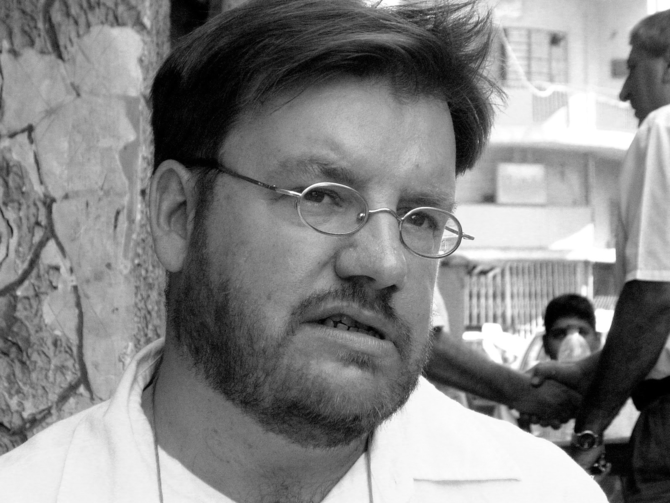
- Antoon was arrested along with other NYU faculty members while attempting to protect demonstrating students from the police
- NYU students were calling for a ceasefire in Palestine's Gaza Strip
LONDON: US police officers on Monday arrested Sinan Antoon, the co-editor of Jadaliyya magazine, during a pro-Gaza demonstration at New York University in Manhattan.
The Arab Studies Institute publication announced in a post on X that Antoon, an associate professor at NYU, was arrested with other faculty members while trying to protect protesting students, who were reportedly calling for a ceasefire in the Gaza Strip.
BREAKING: NYPD arrested Jadaliyya Co-Editor and NYU Associate Professor Sinan Antoon along with other faculty and students as he/they was/were trying to protect NYU students from the Police. We will not ever be silenced.
— Jadaliyya (@jadaliyya) April 23, 2024
Antoon is an Iraqi-American poet, novelist, literary translator and academic. He was born and raised in Baghdad before moving to the US after the 1991 Gulf War.
The Israeli onslaught on the besieged enclave has since Oct. 7 killed at least 34,000 Palestinians, displaced some 1.9 million, and injured more than 75,800 people, according to Gaza’s health authority.
Confirming Jadaliyya’s announcement, human rights attorney Noura Erakat wrote on X: “NYPD is arresting faculty on their campuses for protecting their students.
“The academy is imbricated with the state and the military industry intent on war in blatant abrogation of its mission and any semblance of independence. What a gross betrayal.”
NYPD is arresting faculty on their campuses for protecting their students.
— Noura Erakat (@4noura) April 23, 2024
The academy is imbricated w the state & the military industry intent on war in blatant abrogation of its mission & any semblance of independence. What a gross betrayal. #Gaza #Genocide #Nakba https://t.co/f0tnYhHnNt
On Monday, officers from the New York Police Department moved in on NYU demonstrators after a deadline expired for people to clear an area of the campus, the Financial Times reported.
This came hours after New York’s Columbia University, where more than 100 people were arrested last week, announced it would switch to online classes in an attempt to defuse pro-Palestine protests.
The arrests at the NYU campus are part of a string of US police clampdowns on university students across the country protesting against the war on Gaza.
Local authorities claimed the clampdowns came amid scrutiny over “antisemitism” on US university campuses.
US police also arrested at least 47 pro-Gaza demonstrators at Yale University in New Haven, Connecticut.
The Columbia University clampdown, the first of its kind in three decades, triggered protests on other US campuses, including at Brown University, Berkeley, Princeton, Northwestern, Massachusetts Institute of Technology, and Emerson College in Boston.
In addition to calling for a ceasefire in Gaza, the protesting students also reportedly called for divestment of the university’s funds from companies linked to Israel.


